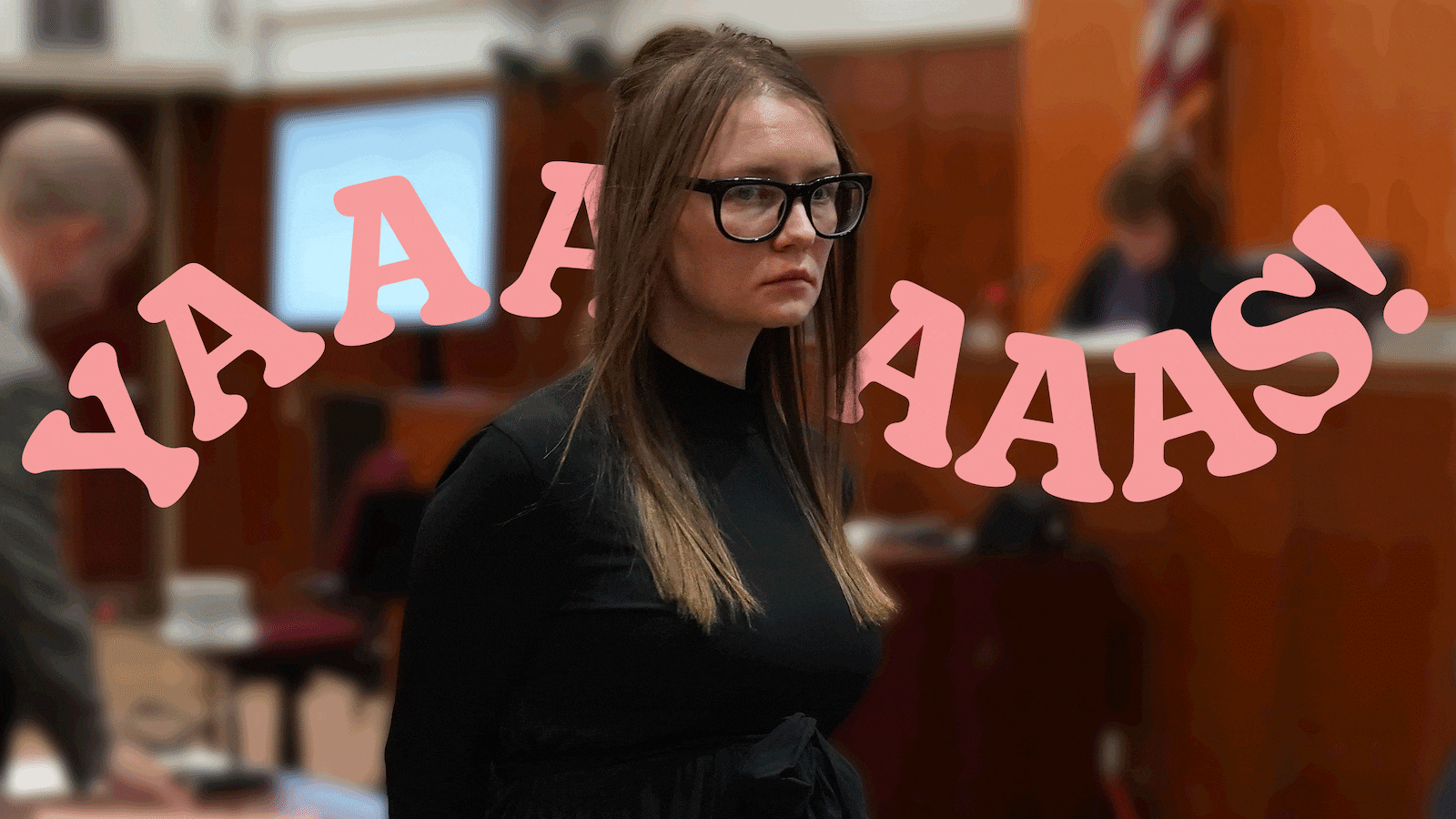Before this week’s arrest of a Wall Street hipster couple accused of laundering $4.5 billion in stolen Bitcoin, Netflix’s Tinder Swindler, and Theranos CEO Elizabeth Holmes being charged with massive fraud over her shoddy blood-testing devices, there was a previously unheard-of scammer residing in New York City: A so-called German heiress by the name Anna Delvey mingled among other monied socialites and floated through elite spaces, harboring lofty plans of creating a Soho House-type private club for the art scene.
It all unraveled when Delvey was exposed to be not a high-flying multi-millionaire with a bottomless trust fund at her disposal but rather a Russian-born grifter named Anna Sorokin who was accused of bilking banks, hotels, a private jet company, and even her supposed friends out of at least $275,000.
Delvey was arrested in late 2017 for grand larceny, but her almost too-crazy-to-be-true story began piquing curiosity in the spring of 2018, when Rachel Williams gave a first-person account in Vanity Fair of how Delvey allegedly scammed her into picking up a bill of $62,000 during a blowout Morocco trip.
In May 2018, a transfixing long-read from New York magazine’s Jessica Pressler laid out exactly how Delvey managed to pull off such a massive stunt, including the most specific details, such as the type of nail polish Delvey preferred—a “light Wes Anderson pink,” to be specific.
The story spread like wildfire online, was passed among friend groups, and dominated the Twitter conversation for the week. By the time Delvey went on trial in early 2019, she had an audience so intrigued by her moves that 8,000 of them would follow an Instagram solely dedicated to her courtroom looks.

Anna Sorokin, better known as Anna Delvey, the 28-year-old German national, whose family moved there in 2007 from Russia, is seen in the courtroom during her trial at New York State Supreme Court in New York on April 11, 2019.
Timothy A. Clary/AFP/GettyWhen Delvey was sentenced to four to 12 years behind bars in May 2019, Netflix had already snapped up the rights to the New York piece and spun the story into the series Inventing Anna, which premiered this week, starring Ozark’s Julia Garner and created by Shonda Rhimes. Delvey was paid $320,000 by Netflix for her life rights, which went toward paying her restitution. (HBO picked up the rights to Williams’ story, with Lena Dunham penning the competing series.)
It’s a testament not only to how outrageous Delvey’s story is, but also how she remains a source of fascination. Only 28 years old at the time of her sentencing, what Delvey was undeniably remarkable (albeit highly illegal). And while her actions and behavior were brazen, Delvey managed to maintain an air of mystery around herself and was utterly unremorseful for her actions.
“The thing is, I’m not sorry,” she told The New York Times. “I’d be lying to you and to everyone else and to myself if I said I was sorry for anything. I regret the way I went about certain things.”
When Delvey’s story first began circulating, she came a few years before the yassification of the scamming lifestyle and the “fake it till you make it” mantra had truly taken hold.
Besides the outfit Instagram, there were no fan pages devoted to Delvey, unlike Holmes who had a small group of cheerleaders calling themselves “Holmies.” They made videos on TikTok dressed like the Theranos founder, wearing her signature red lipstick and black turtleneck, and sold Holmes-themed T-shirts on Etsy that read, “First they think you’re crazy, then they fight you, then you change the world.”
Delvey had another kind of supporter—people who were strangely captivated by her, and dare they say it, a little bit dazzled.
Julia Lipscomb was one such person. She wouldn’t go as far as calling herself a fan or supporter of Delvey, but on some level, couldn’t help but be impressed by what Delvey had almost managed to accomplish.
“She is very relatable,” Lipscomb told The Daily Beast. “She was very young, she started when she was 26. I think she was just trying to have fun and took things a little too far. I admired and was horrified by her confidence. I think most people were fascinated by how she could pull it off and create a life of luxury for herself.”
Lipscomb became aware of Delvey around the same time everyone else in New York did, and it was all Lipscomb and her friend group could talk about. As somewhat of a joke, she looked up the website domain for what Delvey had planned to name her art club, the Anna Delvey Foundation (ADF for short). While the .com address had already been taken, it just so happened that .org was available.
So, Lipscomb whipped out her wallet and purchased www.AnnaDelveyFoundation.org, spending around $60 when it was all said and done. It was meant to be a fun hobby for Lipscomb.
“I just wanted to write a little bit about it, I didn’t want to do it for profit,” she explained to The Daily Beast. “I wanted it to be sort of a DIY, freedom to experiment thing.”
But as other outlets began covering Delvey, cherry-picking lines from various stories about her, Lipscomb wanted to also use her blog to keep track of major updates about Delvey and her case, as well as provide clear sourcing on where the details were originating from, creating a type of archive of which outlets had covered what and when.
Lipscomb kept her blog going throughout the trial, making playful quips about her outfits, posing the question of whether ambition was a bad trait, remarked on casting updates, and even recently covered Delvey’s first-person essay for Business Insider. (Delvey was released from prison in February 2021, but after a few weeks of freedom was picked up by ICE for overstaying her visa. She remains in ICE custody as she waits to see if she’ll be deported.)
“I wanted to do it in a playful way because I was fascinated, but I also wanted to respect her,” Lipscomb explained. “I think even woman grifters tend to be objectified. That’s why when I was writing my posts, I tried not to put too many images of her. I didn’t want to objectify her.”
Like Lipscomb, New York friends Nikki and Zoe became obsessed with Delvey’s story when they caught wind of it in 2018. But instead of making a blog about Delvey or even an Instagram account, they created a parody song of Kesha’s “TiK ToK” filled with references from the article.
“One day, Nikki posted an Instagram Story with a picture of Anna and captioned it, ‘Wake up in the morning feeling like Anna Delvey,’” Zoe explained. “I’m sure I responded, ‘Oh my god, that’s amazing.’ Then she texted me, ‘Should we just write a parody?’ And I was like, ‘Yeah, let’s do it.’”
“The idea snowballed,” Nikki added. “Writing it, I think we did it in a couple of hours, with just text messages back and forth. I have a friend who is a pretty talented singer/songwriter, so I showed her the idea. She was like, ‘This is so cool,’ and she performed it for us. Her boyfriend at the time had a recording studio in his house, so he recorded it.”
Just meant for friends, they posted the song on Soundcloud, titling it “Rooftops, Photo Ops.” The song is undeniably catchy and tongue-in-cheek, with a chorus of: “Rooftops, photo ops, making bank accounts up / Tonight, I’ma lie until I make my trainer cry / Double tap from my likers, I’m not into endin’ up at Rikers.”
Both Nikki and Zoe say they wouldn’t call themselves fans of Delvey but agree there is an aspirational element to what she did.
“I love the idea of somebody who came from nothing being able to take over and really portray like a good grift, a good scam,” Nikki said. “I think it’s a super kind of American-centric story. One of the things that also really interested me about her—she’s kind of a plain Jane, but through how she branded herself, she was able to get over on people.”
“In the term of a fan, I’m not sure,” Zoe said. “I definitely didn’t read it and think, ‘Wow, she deserves to go to prison for what she did.’ I was impressed by it. At the time this happened, I wasn’t super excited about my job that I had at the time, and I wasn’t making a lot of money, so it was kind of an aspirational thing, like, ‘Wow, I could just do this, scam these people and live pretty well for a while,’ you know? So, there was that kind of element to it.”
One of Delvey’s biggest supporters/admirers is Julia Fox, the Uncut Gems actress and Kanye West significant other.
In March 2021, Fox moderated a Clubhouse talk with Delvey, and has been regularly posting messages of support for Delvey to her Instagram Stories, calling her “sis” and campaigning for her to be freed from ICE custody. (Before hitting it big as an actress, Fox was busted for credit card fraud in her twenties.)

Another layer to the fascination with Delvey was how she was almost ahead of her time. In the early and mid-2010s, the era of the “Girl Boss” was just beginning to take form, with the launch of Emily Weiss’s makeup company Glossier, Audrey Gelman’s women-focused co-working space The Wing, and several other female-led startups. (Glossier was eventually accused by its staff of fostering a “deeply humiliating” culture of racism in its stores, while Gelman was forced to resign as CEO of The Wing after staffers revolted due to its purported lack of inclusivity.)
When it comes to Delvey, given the general shift in society’s attitude when it comes to “fake it till you make it,” and perhaps people’s overexposure to large-scale grifts, such as Fyre Fest, it makes you wonder whether Delvey would attract the same widespread attention if she were arrested today.
“I don’t know how political you want to get with this, but I think it started after Trump was elected,” Lipscomb said, explaining that people seemed to be on the lookout for those who might be grifting and angling for something bigger for themselves. “People were looking at how glamorous grifters were living—this idea that they could steal and get away with it and live this life of luxury, all fueled by greed.”

Giudo Cacciatori, Gro Curtis, Giorgia Tordini, and Anna Delvey attend the first Tumblr Fashion Honor presented to Rodarte at The Jane Hotel on September 9, 2014, in New York City.
Dave Kotinsky/Getty“I don’t know if the same thing were to happen today, if I would even have the same reaction or if I would write it off as, oh, that’s just like another thing that happened,” Zoe offered.
Many have drawn comparisons between Delvey and Holmes, who is also getting the streaming treatment next month with Hulu’s The Dropout, starring Amanda Seyfried. (Holmes’ story is also being turned into a movie by Apple, titled Bad Blood and starring Jennifer Lawrence.)
But to Lipscomb, the two fraudsters are not in the same category when it comes to the severity of their scams. “Elizabeth Holmes was in the healthcare space, and she defrauded Walgreens’ customers and regular people,” she explained. “Anna, with the exception of her friend that she [allegedly] left on the hook for $60,000, most of the victims were banks and hotels.”
“They’re in totally different categories,” Nikki agreed. “Elizabeth Holmes was actually trying to create a product. In the early onset of what she was trying to do, [she] presumably had decent intentions behind it, but then wound up being extremely detrimental to a large swath of people. What [Anna] did, for me, falls into a different category. I know it’s obviously not nice to try to scam people who you think are your friends, but it definitely didn’t have as much impact.”
And while none think Delvey is a particularly good person—Delvey herself admitted as much—it doesn’t mean they can’t be impressed by her confidence. “I would love to get a drink with her,” Lipscomb laughed.







